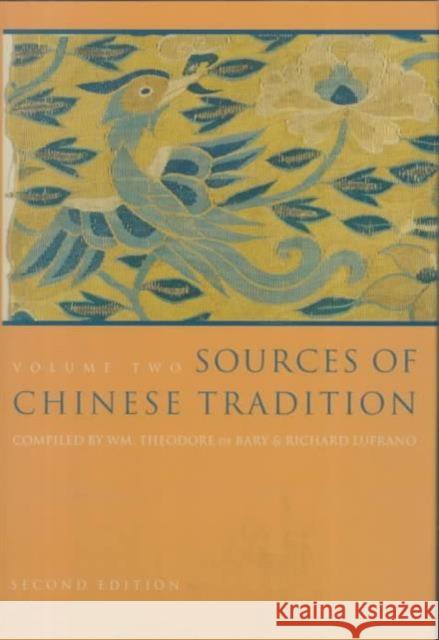Sources of Chinese Tradition: From 1600 Through the Twentieth Century » książka
Sources of Chinese Tradition: From 1600 Through the Twentieth Century
ISBN-13: 9780231112703 / Angielski / Twarda / 2000 / 656 str.
Sources of Chinese Tradition: From 1600 Through the Twentieth Century
ISBN-13: 9780231112703 / Angielski / Twarda / 2000 / 656 str.
(netto: 913,20 VAT: 5%)
Najniższa cena z 30 dni: 782,17
ok. 16-18 dni roboczych.
Darmowa dostawa!
For four decades Sources of Chinese Tradition has served to introduce Western readers to Chinese civilization as it has been seen through basic writings and historical documents of the Chinese themselves. Now in its second edition, revised and extended through Deng Xiaoping and Jiang Zemin-era China, this classic volume remains unrivaled for its wide selection of source readings on history, society, and thought in the world's largest nation. Award-winning China scholar Wm. Theodore de Bary--who edited the first edition in 1960--and his coeditor Richard Lufrano have revised and updated the second volume of Sources to reflect the interactions of ideas, institutions, and historical events from the seventeenth century up to the present day.
Beginning with Qing civilization and continuing to contemporary times, volume II brings together key source texts from more than three centuries of Chinese history, with opening essays by noted China authorities providing context for readers not familiar with the period in question. Here are just a few of the topics covered in this second volume of Sources of Chinese Tradition: - Early Sino-Western contacts in the seventeenth century; - Four centuries of Chinese reflections on differences between Eastern and Western civilizations; - Nineteenth- and twentieth-century reform movements, with treatises on women's rights, modern science, and literary reform; - Controversies over the place of Confucianism in modern Chinese society; - The nationalist revolution--including readings from Sun Yat-sen and Chiang Kai-shek; - The communist revolution--with central writings by Mao Zedong; - Works from contemporary China--featuring political essays from Deng Xiaoping and dissidents including Wei Jingsheng. With more than two hundred selections in lucid, readable translation by today's most renowned experts on Chinese language and civilization, Sources of Chinese Tradition will continue to be recognized as the standard for source readings on Chinese civilization, an indispensable learning tool for scholars and students of Asian civilizations.










